Sanctions by OFAC and Their Impact on Capital Markets

U.S. sanctions enforced under the OFAC sanctions programs play a pivotal role in shaping today’s global financial environment. While these programs aim to restrict the financial activity of specific foreign individuals, entities, and governments, their influence extends far beyond direct targets. In the realm of capital markets, the implications are profound. Investment firms, asset managers, and corporate issuers must navigate a complex web of compliance obligations, where even an unintentional link to a sanctioned entity can cause significant financial and reputational harm.

Exposure to Sanctions and Market Vulnerabilities
Participants in capital markets face an increasing risk of indirect exposure to sanctions. For example, a private equity firm investing in emerging markets might unknowingly become entangled with a company or shareholder flagged under OFAC’s Specially Designated Nationals (SDN) list. The consequences can be immediate and severe: financial assets may be frozen without notice, operational activities suspended, and access to U.S. dollar transactions abruptly cut off. Additionally, financial institutions often reassess their business relationships upon detecting such exposure, which may lead to closure of accounts, termination of services, or delays in credit approvals.
Moreover, in today’s automated financial ecosystem, a single flagged transaction can result in system-wide alerts and automatic holds. The presence of an OFAC alert on credit report may not only disrupt access to new financing but also trigger internal investigations within banks and brokerages. This creates a chain reaction where reputational concerns and perceived compliance risk outweigh any financial rationale for continuing the relationship.

The Role of Due Diligence and Preventive Compliance
One of the most effective tools for avoiding sanctions-related issues in capital markets is due diligence. However, this process must be both rigorous and continuous. Conducting a one-time review of a counterparty or portfolio is no longer sufficient. Today’s compliance landscape requires institutions to establish ongoing monitoring systems that track changes in ownership structures, regional affiliations, and legal designations.
Proper due diligence helps identify not only direct relationships with sanctioned entities but also indirect risks—such as minority ownership stakes, offshore subsidiaries, or contractual dependencies that tie a company to restricted jurisdictions. In practice, this means integrating sanctions screening into onboarding procedures, transaction approvals, and periodic portfolio reviews. While time-consuming, these efforts are essential for avoiding costly enforcement actions and preserving regulatory trust.
Legal Intervention and Strategic Safeguards
When an issue arises—whether it’s a blocked transaction, a regulatory inquiry, or a suspected link to a sanctioned person—companies must act quickly and strategically. Legal counsel experienced in OFAC matters can provide immediate assessment and guide clients through the necessary steps. This includes preparing disclosures, responding to agency requests, and, in some cases, pursuing the unblocking of frozen assets through formal petitions.
Beyond reactive measures, strategic legal planning also plays a key role in long-term risk management. For instance, companies can build legal mechanisms into contracts that allow for automatic termination or indemnification in the event of sanctions-related complications. This ensures that when sanctions become relevant, businesses are not left scrambling for solutions but instead have predefined paths to minimize damage.
Sustaining Compliance in a Rapidly Evolving Environment
The global sanctions landscape is not static. Geopolitical shifts, diplomatic tensions, and legislative developments mean that the list of sanctioned entities is frequently updated. This places a heavy burden on financial actors to remain informed and responsive. Relying solely on internal compliance teams is often insufficient, especially for multinational firms operating across several jurisdictions. Instead, partnerships with external advisors, legal auditors, and technological service providers can offer an additional layer of security.
Equally important is fostering a corporate culture that prioritizes compliance—not merely to avoid penalties, but as a marker of business credibility and long-term viability. Investors and regulators alike increasingly assess not only financial performance but also ethical and legal soundness. Staying compliant with OFAC regulations thus becomes a competitive advantage, signaling reliability and accountability in a crowded marketplace.
Conclusion
Capital market participants cannot afford to underestimate the reach of U.S. sanctions programs. As regulatory scrutiny intensifies, the risks of inaction multiply. Whether through blocked funds, disrupted transactions, or damaged reputations, the consequences of non-compliance are significant. Yet with the right strategies—early due diligence, legal readiness, and continuous adaptation—businesses can navigate this high-risk terrain effectively. Understanding how OFAC sanctions function, and responding with clarity and foresight, is essential to protecting assets and maintaining operational resilience in today’s financial world.
